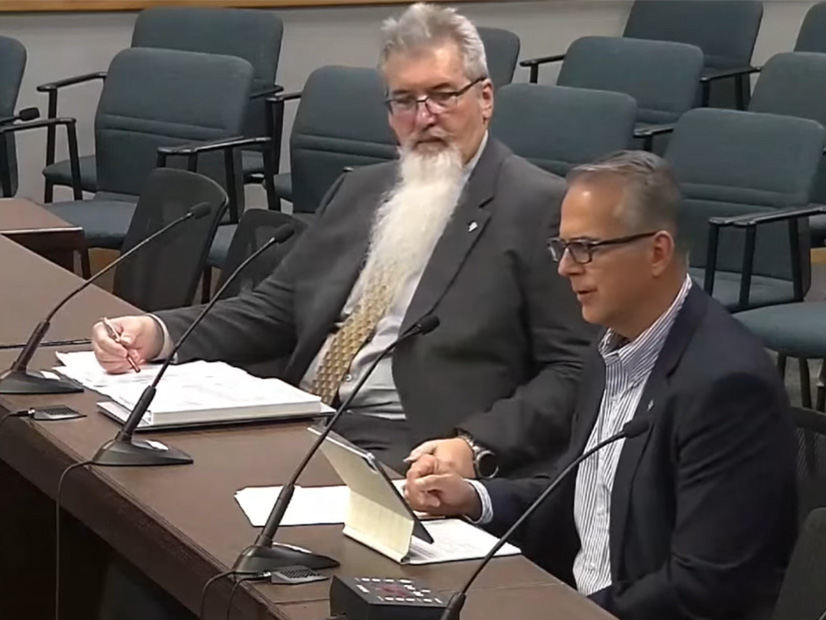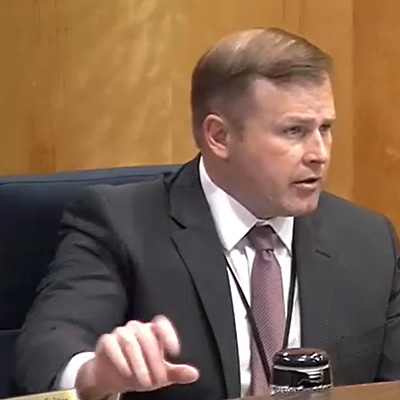ERCOT’s senior leadership defended the grid operator’s 2024-25 budget and its planned 27.9% increase to its system administration fee during a public hearing Friday before the Public Utility Commission’s legal counsel.
CEO Pablo Vegas said the ERCOT board’s Human Resources and Governance Committee invited stakeholder feedback regarding strategic priorities and objectives for the next five years. He said that feedback informed the budget’s development.
The ISO is proposing the first increase to the administration fee since 2016, raising it from $0.555/MWh to $0.710/MWh. Much of that difference will be passed on by retailers to ratepayers. Consumer advocates didn’t oppose the increase, saying it was long overdue and will help pay for the real-time co-optimization project that is expected to save billions.
The biennial budget will provide ERCOT with $424.03 million and $426.99 million in 2024 and 2025, respectively. That will cover operating expenses, project spending and debt-service obligations.
The board approved the budget and administration fee increase during its June meeting. (See “Board OKs 27% Increase in Admin Fee,” ERCOT Board of Directors Briefs: June 19-20, 2023.)
“The board’s approval reflects that the budget complies with ERCOT’s financial corporate standard and associated financial metrics approved by the board,” Vegas said, reading from his tablet. “The board, along with ERCOT management, supported the reasonableness of the budget request to provide for ERCOT operations and meet our strategic objectives for 2024 and 2025, including the commission’s requests.”
Vegas told Kasey Feldman-Thomason, the commission’s general counsel and the hearing’s moderator, that ERCOT considered several alternatives to the administration fee’s increase. Management looked at an increase each year, every other year, or every four years.
The board, after “significant deliberation,” ultimately approved a rate increase that keeps the admin flat for four years, Vegas said. The next increase is projected to occur in 2028.
“This option was selected for three principal reasons” he said. “One, it addresses potential liquidity constraints in 2024 and 2025, resulting from deferring the expected increase from 2022 into 2024. Second, it provides great stability to Texas consumers. And three, it helps to minimize the potential intergenerational inequity issues among the ratepayers by appropriately charging ratepayers for the services they are receiving.”
ERCOT held off on increasing the fee in 2020. The deadly 2021 winter storm has increased the grid operator’s costs for legal support and IT projects, the latter a result of recent legislation.
“ERCOT maintains acute awareness that consumers of Texas fund ERCOT,” Vegas said.
The grid operator has asked that the budget be approved by Nov. 15. It will become effective Jan. 1.
During the PUC’s open meeting on Thursday, Commissioner Will McAdams encouraged stakeholders to participate in the budget hearing.
“The magnitude of the increase is significant, and I want to hear from stakeholders,” he said. “We so far have heard nothing about that within the ERCOT process … I’d like to know a little bit more detail about if there are questions or concerns and then how that affects the commission’s deliberations.”
The Texas Industrial Energy Consumers and Sierra Club were the only two groups to ask for more information from ERCOT during the hearing. They asked for more analysis of some of staff’s assumptions and questioned the need for additional legal and public affairs staff.
The hearing’s notice was not posted to the PUC’s online calendar until Thursday over what the commission’s executive director, Thomas Gleeson, called an “oversight.” He said a different meeting accidentally was posted first.
Nuclear Group Names Members
Commissioner Jimmy Glotfelty said he has a “well-rounded” members’ list for the PUC’s Texas Advanced Nuclear Reactor Working Group he is chairing (55421).
“We are going to be moving very [quickly], but we are excited to be moving forward,” he told the commission. “I’m just happy that we got over this hurdle.”
The 17-member list, released Oct. 10, includes ERCOT CEO Pablo Vegas; Entergy’s Dillon Allen, senior manager of advanced nuclear development; CPS Energy’s Bret Colby, nuclear oversight principal as part of the municipality’s ownership stake in the South Texas Project; and Clayton Scott, executive vice president of business development for NuScale, a developer of advanced nuclear reactor technology.
Glotfelty said those not selected shouldn’t feel they’re not part of the group. He said six or seven more teams will be formed to address specific issues such as supply chains and high technology interest in the Texas workforce, similar to the commission’s Aggregated Distributed Energy Resources (ADER) task force.
“We had two leaders and we had about 70 people participating,” Glotfelty said. “That’s what we want in this.”
Texas Gov. Greg Abbott (R) in August ordered the working group’s formation. It is to evaluate what steps need to be taken so advanced nuclear reactors can provide power for Texas. The group must report its findings and recommendations to Abbott by Dec. 1, 2024.
PUC Missing RRs’ Discussion
The PUC approved 29 ERCOT protocol changes and other revisions, but not before Glotfelty questioned the grid operator’s COO, Woody Rickerson, to better understand the revisions’ effect on the ERCOT market (54445).
“I don’t feel like we get the benefit of the discussion when these protocols are being approved,” Glotfelty said. “There are a lot of policy issues in here that I think rise to the commission level that we should take a position on … I also think that there has been some shyness to speak your mind during the ERCOT committee process as a result of feared backlash.”
Under legislation passed after the 2021 winter storm, the PUC now must approve revision requests after they emerge from the stakeholder process. ERCOT’s Board of Directors approved the last round of revision requests in June with minimal discussion.
The pre-Winter Storm Uri board would hold closed sessions before its meetings so the independent directors could ask clarifying questions about the changes.
“We’re supposed to all be working in one direction, but I do think the reason we’re asking these questions … is how do we stay out of this technical condition of potential system failure?” McAdams said. “The stakeholder votes on these policies are extremely important and we look to those. So, if they’re not 100% on board, we need to know that.”
The commission also approved publication of a rule that repeals and replaces the state’s renewable portfolio standard with a temporary solar-only renewable energy credit as required by 2023 legislation. The temporary program will expire Sept. 1, 2025 (55323).





